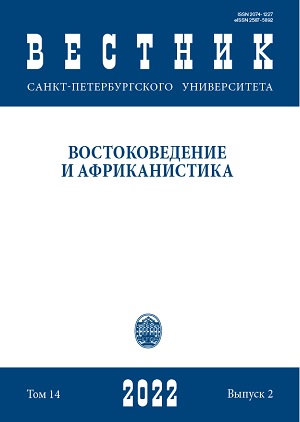Unsheathing Poet’s Sword Again: The Crusades in Arabic Anticolonial Poetry before 1948
DOI:
https://doi.org/10.21638/spbu13.2022.211Abstract
Both Arab and Western scholars agree that, starting in the mid-20th century, the correlation of Western Europeans with the Crusaders and the extrapolation of the term “Crusade” to modern military conflicts have become an integral part of modern Arab political discourse, and are also widely reflected in Arab culture. The existence of works examining references to the theme of the Crusades in Arab social thought, politics, and culture of the second half of the 20th century contrasts with the almost complete absence of specialized studies devoted to the analysis of references to this historical era in Arab culture in the 19th century and first half of the 20th. An analysis of references to the era of the Crusades in the work of Arab poets before 1948 shows that, already in the period of the Arab Revival, this topic occupied an important place in the imagery of anti-colonial poetry, and not only in Egypt, Syria, and Palestine, historically attacked by the Crusaders, but also in other regions of the Arab world. If, before World War I, Arab poets only praised the commanders of the past who defeated the Crusaders, then afterwards the theme of the Crusades was also used to liken the European colonialists to the “medieval Franks”. The authors of the poems containing images from the era of the Crusades were, among others, the participants of the Arab Uprising of 1936–1939 and the Arab-Israeli War of 1947–1949, who set their goal with the help of poetry to mobilize the masses for the struggle.
Keywords:
Crusades, Arabic poetry, nationalism, Arab Revival, anticolonial struggle
Downloads
References
Downloads
Published
How to Cite
Issue
Section
License
Articles of "Vestnik of Saint Petersburg University. Asian and African Studies" are open access distributed under the terms of the License Agreement with Saint Petersburg State University, which permits to the authors unrestricted distribution and self-archiving free of charge.





